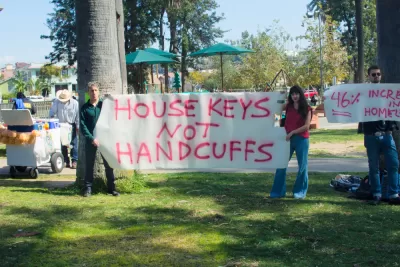‘Housing First’ and other evidence-driven homelessness response programs are showing success in some cities and regions while the number of unhoused people rises across the nation.

A Brookings report by Hanna Love and Tracy Hadden Loh assesses the state of homelessness in the United States and how some cities and regions are making progress on housing their residents even as housing costs grow and the supply of affordable housing remains insufficient to meet demand.
“In nine out of the 44 major cities that completed full PIT counts in 2023, homelessness rates either remained stable or declined between 2022 and 2023, with rates in Austin, Texas, Raleigh, N.C., Indianapolis, and Colorado Springs, Colo. declining over 10 percentage points.” Major cities like New York, Boston, and Chicago saw sharp increases in homelessness rates between 2022 and 2023, but those cities saw an overall reduction in homelessness over the last decade.
Looking at the larger picture of short- and long-term total and unsheltered homelessness trends, it’s clear that there are pockets of both progress and setbacks in U.S. cities—reinforcing the need for upstream solutions that can meet cities and regions where they are.
The report recommends five evidence-based strategies that can help ease the crisis. These include ensuring that housing policy tracks with homelessness policy, using both short- and long-term tools like emergency rental assistance, ‘housing first’ models, and zoning reform that spurs more housing production. Other suggestions include strengthening housing and employment supports for vulnerable populations, using alternative crisis response models to reduce the risk of negative interactions with law enforcement, and taking a “regional, data-driven approach” to homelessness to respond to broader structural challenges.
FULL STORY: Despite a national spike in homelessness, some US regions are finding solutions

Planetizen Federal Action Tracker
A weekly monitor of how Trump’s orders and actions are impacting planners and planning in America.

Maui's Vacation Rental Debate Turns Ugly
Verbal attacks, misinformation campaigns and fistfights plague a high-stakes debate to convert thousands of vacation rentals into long-term housing.

San Francisco Suspends Traffic Calming Amidst Record Deaths
Citing “a challenging fiscal landscape,” the city will cease the program on the heels of 42 traffic deaths, including 24 pedestrians.

Amtrak Rolls Out New Orleans to Alabama “Mardi Gras” Train
The new service will operate morning and evening departures between Mobile and New Orleans.

The Subversive Car-Free Guide to Trump's Great American Road Trip
Car-free ways to access Chicagoland’s best tourist attractions.

San Antonio and Austin are Fusing Into one Massive Megaregion
The region spanning the two central Texas cities is growing fast, posing challenges for local infrastructure and water supplies.
Urban Design for Planners 1: Software Tools
This six-course series explores essential urban design concepts using open source software and equips planners with the tools they need to participate fully in the urban design process.
Planning for Universal Design
Learn the tools for implementing Universal Design in planning regulations.
Heyer Gruel & Associates PA
JM Goldson LLC
Custer County Colorado
City of Camden Redevelopment Agency
City of Astoria
Transportation Research & Education Center (TREC) at Portland State University
Jefferson Parish Government
Camden Redevelopment Agency
City of Claremont





























